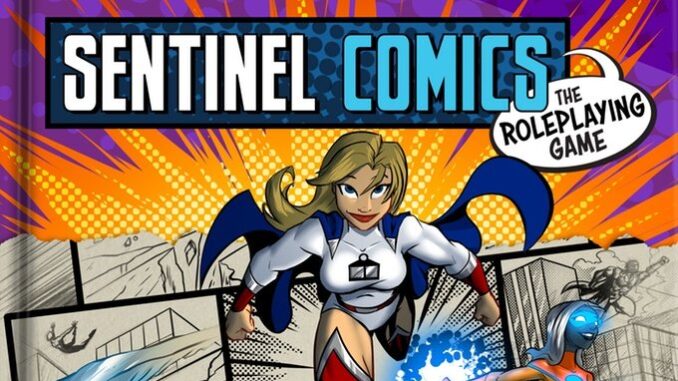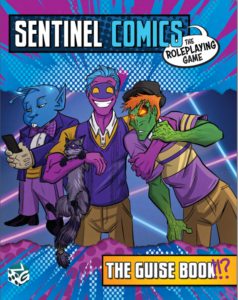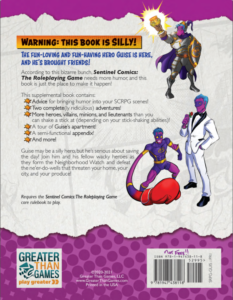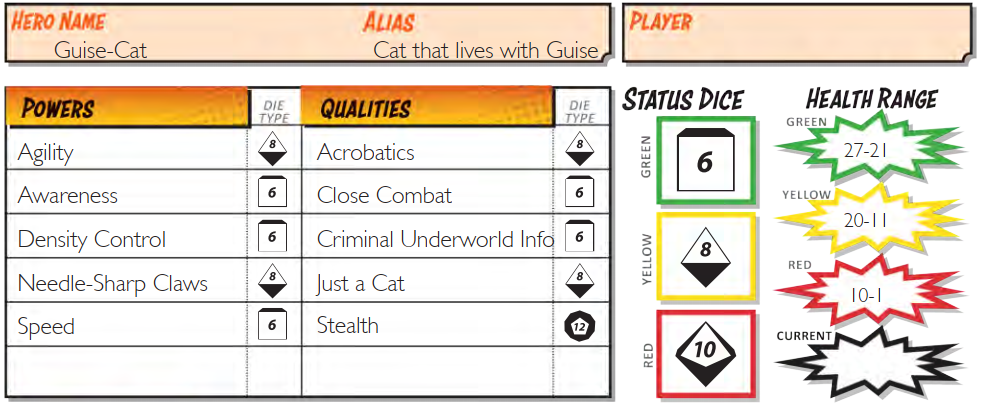
Last week, those who backed the Sentinel Comics: The Roleplaying Game Kickstarter got their hands on the digital version of the first supplement – The Guise Book. I took the weekend to page through the PDF and want to give my first impressions of it.

For those of you not in the know, Sentinel Comics: The Roleplaying Game was launched in 2019 as a roleplaying game set in the universe created Greater Than Games for the Sentinels of the Multiverse card game. Set after the events of the card game’s final expansion, it’s designed to let players design their own heroes to keep the world safe in the aftermath of the “OblivAeon Event,” a cosmic threat that nearly ended our reality as we know it. The Guise Book was one of the campaign’s first stretch goals. Many of the heroes within the card game are representative of other superheroes that we know and love. Legacy is what I think a combination of Superman and Captain America. The Wraith is a gender-swapped Batman type of superhero. Guise is the Sentinel’s version of Deadpool – he knows he’s a comic book character and he’s not afraid to use that knowledge to his own benefit. As such, the book is not just about Guise, but frequently features little notes from Guise, usually written in purple marker.

The book starts with a small section written by Laser from the Doubleclicks on how to bring comedy into your game, and this was something that I didn’t know that I needed. It’s only a couple of pages long, but it covers the very basics on what comedy is along with some simple ways that you can bring it into your game along with some simple dos and don’ts such as making sure your jokes are punching up and not down, avoiding stereotype, and being sensitive to the other players’ histories and potential triggers. It also includes what to do if you screw up and put your foot in your mouth by attempting to joke about something you shouldn’t – aka, make a genuine apology and ask if anyone needs a break before continuing. Comedy is one of those things that lots of people think they can do, but it doesn’t take them long at an open mic night to discover there’s a difference between “doing a comedy routine” and “doing a good comedy routine.” Other genres like horror and romance get discussed a lot within the pages of roleplaying game guides, but unless the game is “supposed to be funny” comedy is often not discussed, or if it is it’s a little footnote as a way to break some tension in a horror game. All in all, this was an excellent, if short addition that I would definitely like to see more of in other games.
After this little introduction, the book gives two fully fleshed out adventures for a GM to run for their players, both of them featuring Guise and some of his enemies. I don’t want to spoil anything about the adventures, but suffice to say they are both excellently written. The first one features a time travel adventure replete with everything that makes my Arthurian Legend loving heart go pitter patter. The second one is a little less epic in scope, but hilarious nonetheless.
The final half of the book features new datasheets for both heroes and villains, featuring Guise and the members of his “Neighborhood Watch” including Guise, “The Real Guise,” gardener stranded here from his home reality of The Extremeverse Hedge Lord, and several other new heroes. Arguably the most important, however, is Guise-Cat who is just an alley cat that lives in Guise’s apartment and occasionally fights crime. If there are four more important pages in an RPG Sourcebook, I’ve yet to find them. Following these new hero files is a number of new villains that Guise and his crew constantly battle and annoy in equal measure and finishes up with a new environment to set a scene in – Guise’s Apartment.

All in all, this book feels a little bit on the smaller side only clocking in around 100 pages, but there’s a lot to like in here. The adventures themselves are definitely good for several sessions worth of zany adventures and the beginning “Comedy 101” section is worth it’s weight in gold and the book itself is just a joy to read. The writers did some solid work getting the feel of the book right and it is definitely going to be worth checking out for your Sentinel Comics games when it hits the market for public consumption.
